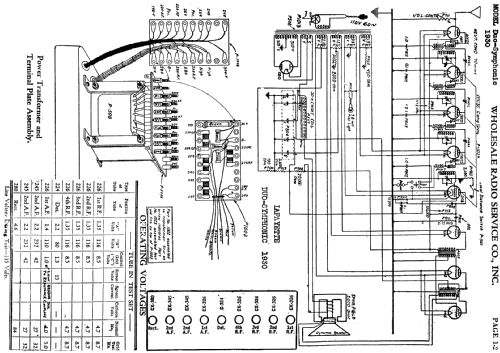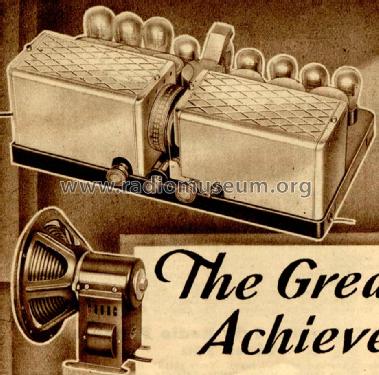Duo Symphonic 1930 Chassis and LS 226
Lafayette Radio & TV Corp; New York (NY)
- Country
- United States of America (USA)
- Manufacturer / Brand
- Lafayette Radio & TV Corp; New York (NY)
- Year
- 1929/1930
- Category
- Broadcast Receiver - or past WW2 Tuner
- Radiomuseum.org ID
- 66645
-
- alternative name: Wholesale Radio
Click on the schematic thumbnail to request the schematic as a free document.
- Number of Tubes
- 9
- Main principle
- TRF without regeneration; Neutrodyne
- Tuned circuits
- 4 AM circuit(s)
- Wave bands
- Broadcast only (MW).
- Power type and voltage
- Alternating Current supply (AC) / 50 to 60 cycles, 105 - 120 Volt
- Loudspeaker
- Electro Magnetic Dynamic LS (moving-coil with field excitation coil) / Ø 12.25 inch = 31.1 cm
- Material
- Metal case
- from Radiomuseum.org
- Model: Duo Symphonic 1930 Chassis and LS [226] - Lafayette Radio & TV Corp; New
- Shape
- Chassis only or for «building in»
- Notes
- Both, "Radios Collector's Guide 1921-1932" (McMahon) and Rider's Perpetual volume 1 show this model under "Wholesale" instead of "Lafayette". See also "Duo Symphonic 1931" with dual volume control (antenna and AF stage) and "Great Duo Symphonic". According to McMahon, the Duo Symphonics have one untuned RF circuit and 3 tuned RF circuits - but Rider's shows clearly that it has 4 tuned circuits (4 gang tuning condenser) and two stages AF with push-pull output. In order that the model can be found by tube search with tubes CX326 or 226, we distinguish this otherwise same chassis here only! CX tubes are from Cunningham. The detector tube is the only screen grid tube C324 or a 224.
The Lafayette Duo Symphonic is in fact using the Wells-Gardner & Co chassis model C or CG, first type. You see this clearly by comparing the Rider's schematic Wells-Gard. page 1-1 and 1-2 (see versions) with the schematic "Wholesale" page 1-2. It is the "Old Type" schematic.
Nevertheless, Lafayette describes this the following way: "The problems of our engineers was not only to build a receiver that would outperform anything in the world, but to build the dame receiver at a price that would bring it within reach of the average home."
The catalog 1930 for season 1929/30 names this 9 tube TRF chassis a "Screen-Grid Neutrodyne Neutrodyne-Beers Double Primary". The Lafayette Duo-Symphonic Screen-Grid has a "special Utah Stadium Dynamic-Speaker chassis" producing from 30 to 5000 cycles, linear power detection and local distance switch. We don't know the tube line up, just that it has 2 tubes 245 for push-pull operation. The same chassis is used for Lafayette Duo-Symphonic models 342, 316, 324, 370, 343, 300, 362, 357, 325, 329, 350 and 352, a Phono-Radio Combination.
The list price for the chassis 9 tube Screen-Grid Duo-Symphonic incl. Utah Stadium Dynamic Speaker is $ 131.75 without tubes/aerial equipment or $ 156.50 with - but Lafayette puts a price of $ 64.50 or $ 76.64 all inclusive. There is no measurement given for this model. See details and summaries for the models of this catalog.
- Price in first year of sale
- 77.00 $
- External source of data
- Ernst Erb
- Circuit diagram reference
- Rider's Perpetual, Volume 1 = 1931/1934 (for 1919-1931)
- Literature/Schematics (1)
- Lafayette Radio Catalog (Wholesale Radio Service Co. Inc. catalog 1930 for 1929/30, page 18 - 31. 17.)
- Other Models
-
Here you find 1377 models, 1195 with images and 422 with schematics for wireless sets etc. In French: TSF for Télégraphie sans fil.
All listed radios etc. from Lafayette Radio & TV Corp; New York (NY)



